For such a small stream, the water is still running pretty darned high as we peer into the edge. It rather sums up a river fishing season many of us will remember for not so brilliant reasons. Not least of all for Bob James. Subjected to allegations, rumors and finally the court, it’s been a period of several bruising months for him.
On the other side of the ordeal, Bob James is philosophical about the whole charade: “I can’t turn back the clock,” he says, “but I’m sorry for what went on and to anyone who feels let down.”
In the backlash that followed, forums were alive with opinions ranging from “what’s the big deal?” to “ban him for life!”
It’s perhaps only with a little distance that a bit of perspective has arrived for all parties concerned. Bob James was punished for straying outside the rules, but this doesn’t turn an angling legend into Lance Armstrong. After a fine and a torrid six months, Bob himself has also gained some perspective, which he sums it up in a single sentence: “I couldn’t be more proud of what I’ve achieved within and for angling, but I couldn’t be less proud of what happened last June 14.”
Back on the Bank
Looking at Bob I get the feeling he is simply relieved that events are now behind him – or at least they were before I turned up. One thing the experience hasn’t diminished is his love of classic river fishing, however. Watch him at play on running water and you quickly realize that, for any human errors, there is still a subtle magic in the way he brings a centrepin reel and stick float to life. On a crisp winter morning, it’s bloody close to poetry. (I have to agree, I’ve not fished with finer – Ed.)
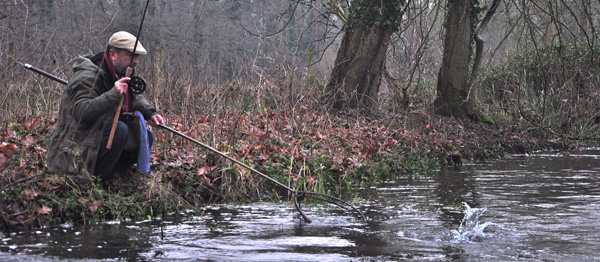
On casual viewing, the trot through of a red float tip looks effortless. The devil is very much in the detail however and Bob is the total antithesis of the magazine article that says, “Learn my latest big trick to catch the big one.”
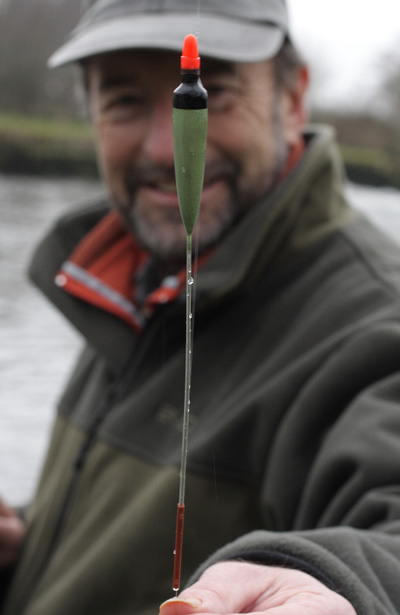 Here’s a news flash for any young fisherman: There is no one trick! There is no single gimmick that will render you a fishing genius. It is about putting all the little skills together, doing lots of small but well-learned things well. Every little part of the process is fluent and considered – the way just enough bread is pinched onto the hook, the accuracy of his mashed bread feed, the deft little cast that follows, the subtle touch on the centrepin to control the bait, the side strain which picks the fish out from the shoal without taking the rest with it. And quite probably the other sixty things I’m still watching him like a hawk, trying to pick up on.
Here’s a news flash for any young fisherman: There is no one trick! There is no single gimmick that will render you a fishing genius. It is about putting all the little skills together, doing lots of small but well-learned things well. Every little part of the process is fluent and considered – the way just enough bread is pinched onto the hook, the accuracy of his mashed bread feed, the deft little cast that follows, the subtle touch on the centrepin to control the bait, the side strain which picks the fish out from the shoal without taking the rest with it. And quite probably the other sixty things I’m still watching him like a hawk, trying to pick up on.
The one thing which always surprises me about Bob’s set up is how comparatively heavy his trotting tackle is, even for a stream no more than four feet deep. He fishes 3lb line straight through, with a large stick float (in this case a Dave Harrell wire stemmed 4AAA model) and the simplest of shotting patterns (a bulk of shot and just a single No.1 shot 6-8” from the hook). The large float gives him better control, and makes it possible to hold back the bait with ease. Incidentally, for all those who thought specimen roach and dace needed a tiny hook, Bob usually selects a 10 or 12 for bread flake.
He is also very particular about the float taking a ‘set line’ along the river. Six inches too far or too short can make all the difference. Identifying a key ‘taking point’ in the swim is also important. In other words, that specific spot where you can almost sense the bite coming on every trot through, once the swim is established.
The roach and dace on the southern rivers he inhabits, from main channels to little carrier streams, are creatures that often resemble the fish of my home waters in name only. They are bigger, fatter and finer. Some of the dace splashing into the net are bigger than many of the chub I catch.
An open and closed debate?
Over a cup of tea in the fishing hut, I’m thinking it’s probably time for Mr James to take his tin hat off. On reflection it’s probably just as well Bob is of the old school and has had little to do with social media in the last months. Short of launching drone strikes on Bob’s house, just about every solution was cooked up. So much for trial by internet, a process which seldom brings out the best in any of us.
Perhaps the harshest assumption was that Bob didn’t give a hoot about the case. “It was a six month sentence, barely a day went by when I didn’t relive it,” he recalls. “That was the real punishment. It’s horrible. You turn in on yourself and it eats away at you like a cancer. It affected me deeply – and yes, I lost sleep over it.”
Perhaps my own main gripe was that Bob should have apologized earlier. Contrary to what his critics believe, I can vouch that this was a man upset and angry at himself. I’ll also vouch that he can be a ‘stubborn old bugger’, something I never thought I would say to the mild-mannered star of ‘A Passion for Angling’.
My own response to the allegations was a mixture of surprise and disappointment. Admittedly, I have a degree of bias. But this comes mainly because of all the rogues and gentlemen I’ve ever fished with Bob has been one of the most civilized and helpful. He’s also a real mine of information; where others trot out the same answers each season, his is an original, questioning mind that never rests on textbook logic. This is why, in spite of any human flaws, dismissing Bob James from the angling world would be a bit like taking a Bentley to the scrap yard because there are a few flies sticking to the windscreen.
Bob James is no saint. I could tell you in great detail about other crimes he’s guilty of. For one thing he is a ‘clean freak’. I’ve lost count of the number of times he’s given me a lecture for handling rods and reels with bait stained fingers. He never fishes without a clean towel to hand. And yet weirdly he has no great sentimentality about ‘favourite’ tackle and is quite happy to chop and change. He also doesn’t really like maggots. I’m not even joking – I swear the man is going soft. “They’re pretty nasty things” he admits, “I tend to use them only in the winter or when all else fails – I don’t even like having them in my car to be honest.” You heard it here first.
He’s also a bugger for picking up on your little mistakes when you fish. Even more annoyingly, he’s damned nearly always right. At least he doesn’t hog swims like some I know, and is also perfectly happy just to stop fishing and watch the river, which is one reason so many of those he guides come away with the spoils.
Showdown on a Chalkstream
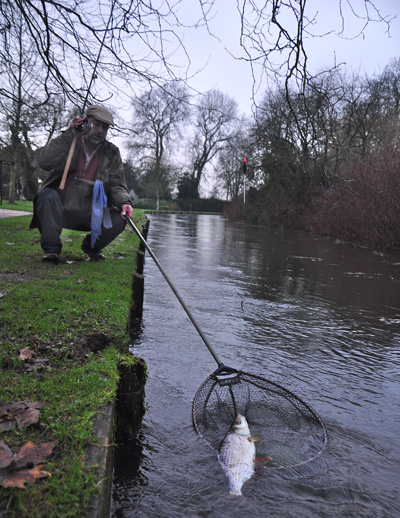 Back to the fishing and Bob is still making short work of the roach and dace, along with the odd accidental, out of season trout. Personally, I suggest we send a lynch mob out on behalf of the flyfishing fraternity. It’s probably just as well he knows the river manager here, Phil Marshall.
Back to the fishing and Bob is still making short work of the roach and dace, along with the odd accidental, out of season trout. Personally, I suggest we send a lynch mob out on behalf of the flyfishing fraternity. It’s probably just as well he knows the river manager here, Phil Marshall.
For many seasons now, Phil has been an unsung hero in conservation, working to undo decades of mismanagement that saw coarse fish removed as vermin. It’s an initiative in which Bob has also been a crucial voice in his long stint being involved in angling on both a practical and a political level.
“Things have changed a great deal,” says Phil. “In the early days some of the traditional types would literally hurl abuse in our faces. Nowadays, they’re more likely to come and ask about our management practices.” The entire river ecology here, from mayflies to bird life, has also benefitted from a more open-minded, holistic approach.
Over a cup of tea in the fishing hut, I’m also excited to hear that even the pike are making something of a comeback. So while Bob finds a new spot to play with his pin, I gather together some predator tackle. Sadly the river is pushing through too hard for my first love of flyfishing for pike.
In more ways than one it has been a freakish season, as Bob recalls first hand. “I’ve never seen it this coloured on the chalkstreams,” he admits. “It usually takes only a few hours to settle – but it’s been high for months now. There’s a borehole on the chalk downs where they measure the level of the water table, and I believe in the late spring it was 28ft down. When they took the lid off in the autumn a 3ft spout of water flew out of the ground.”
Come hell or high water though, I’m determined to teach the old dog a lesson on the pike front. With not a touch on a legered sardine, I reach for some soft lures in the shape of bright, 6in Kopytos. The river is pushing hard and full, but if this is what you call heavily coloured my name’s Barack Obama.
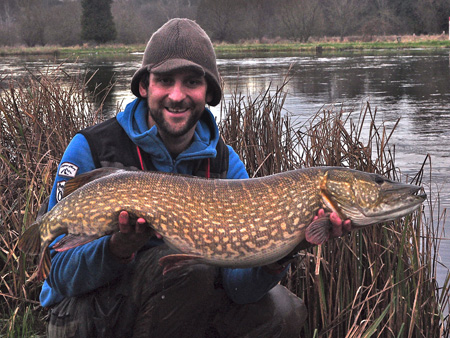 After many casts, with my enthusiasm just starting to wilt a bit, I come to a nice protruding ‘shoulder’ on the main river and a slacker looking margin. For the hundredth time the lure splashes down. About two rod lengths out everything stops solid and there’s a sudden, spine-tingling thump on the rod tip. Thirty yards of line later, I’m wondering if I’ve hooked a salmon as I frantically try and get downstream of the fish.
After many casts, with my enthusiasm just starting to wilt a bit, I come to a nice protruding ‘shoulder’ on the main river and a slacker looking margin. For the hundredth time the lure splashes down. About two rod lengths out everything stops solid and there’s a sudden, spine-tingling thump on the rod tip. Thirty yards of line later, I’m wondering if I’ve hooked a salmon as I frantically try and get downstream of the fish.
It’s only as the drag stops clicking and the lunges get weaker I lay eyes on her. The sheer length and thickness of the fish become a sudden reality as she creeps over the net frame. Water seeps into my wellies and I’m trembling a little as Phil and Bob come round the corner. “Good fish?”
Any big pike is always a sight, but a mid twenty from prime, chalk-filtered water is another beast entirely. She’s a vividly marked fish of emerald scales and cream spots, absolutely solid round the middle. Bob James eat your heart out! “It’s a young man’s game this pike fishing,” he concedes, “lovely fish.”
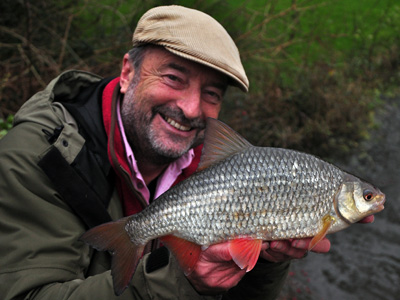 As we head back to the carrier stream, I resist the temptation to gloat, reflecting that I’d probably be only the last in a long line to give Bob James an ear bending this season.
As we head back to the carrier stream, I resist the temptation to gloat, reflecting that I’d probably be only the last in a long line to give Bob James an ear bending this season.
It’s time to move on. There’s just about enough light to trot one last swim on the way back. So often this is the best time of day and Bob lands two stunning roach with an ease that borders on the casual. Like I mentioned earlier, he’s a bugger for doing that.
Guilty as charged I would say.










